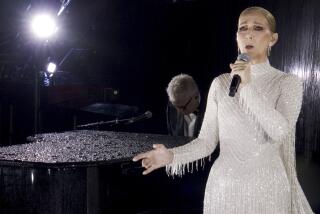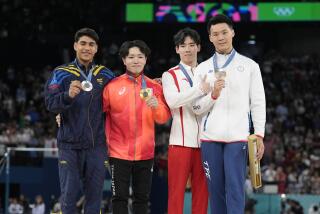Olympics show the Old World anthems’ age
- Share via
If you’re watching the tape-delayed coverage of Olympic sports, you might be wondering: Why do those national anthems, ours included, have so little to do with the true culture of the countries they are supposed to represent?
I listened to the playing of “The Star-Spangled Banner” as Michael Phelps, the U.S. swimming star, appeared to struggle with the words to the national anthem as he was awarded his first gold medal. As I did, I had to remind myself that the tune began as a British drinking song that had nothing to do with the Stars and Stripes or the infant Republic. It was only after Francis Scott Key outfitted it with patriotic words, in 1814, that it became as indelible a symbol of American as the flag, the Fourth of July and Donald Trump.
It’s not like this country doesn’t have enough troubles. Do we really need, on top of that, some stodgy march from the Old World whose words nobody can get right (is it “through the perilous fight” or “perilous night”?). How much better it would be if we adopted the late Ray Charles’ version of “America the Beautiful” or James Brown’s “Living in America” as the nation’s celebratory hymn. Wouldn’t that be a better, politically and culturally hipper reflection of today’s American society to send around the world?
Missing the culture
Sadly, other countries haven’t done much better. With few exceptions, national anthems don’t contain indigenous musical elements, and most are mired in the bloated pomp of the 19th century. Listening to most of them is as much of a snooze as watching synchronized swimming.
Ah, but wouldn’t it be great if an Olympic medalist from Argentina were saluted with a tango? Or a Jamaican with a Bob Marley song? Or a Cuban with a salsa number?
How thrilling it would have been for even non-Australians to hear the band strike up “Waltzing Matilda” when swimmer Ian Thorpe got his medal. Instead, we were treated to the dull anthem “Advance Australia Fair” -- this even though many Aussies have long recognized “Waltzing Matilda” as their true anthem.
Of course, not all old anthems are bad anthems. The good ones are good because they salute the soul of a nation, not just its flag, people or traditions; they do so with words and music that resonate in the mind with a fervor and sincerity that leap across national boundaries.
Think of the noble, swelling hymn that is Britain’s “God Save the Queen.” It’s the world’s oldest anthem, dating to 1745. The tune is so good that it has been adopted by other countries, including Liechtenstein; indeed, when Liechtenstein faced England in a recent European Football Championship qualifying game, fans had to listen to the same anthem played twice.
Think of the French “Marseillaise.” This smart, vigorous, unabashedly patriotic call-to-arms moves proudly up the scale like a tricolore thrust to the heavens. Even when a French athlete loses, just playing the French national anthem will send consoling shivers down the spines of every red-blooded French spectator.
Or think of China’s catchy, fanfare-like anthem, “March of the Volunteers,” which sounds rather like an Asian riff on Elgar’s “Pomp and Circumstance” march.
Yes, it was a bit disconcerting to see the young and petite Chinese synchronized divers, Guo Jingjing and Wu Minxia, accepting their medals while an anthem bearing such belligerent lyrics as “Brave the enemy’s gunfire, march on!” was playing in the background. But the image did serve as a reminder that most anthems, including our own, were born of bloodshed and strife, forged from the nationalistic spirit of the Romantic century.
Never mind catchy tunes and stirring lyrics. When it comes to national anthems, achieving a tone of high seriousness and boosting the authority of the state have long been deemed more important than artistic worth.
The result is that most anthems -- even when they take the form of hymns, marches, songs or fanfares -- come off as pompous dirges.
Even the ones that stick in the ear sound as if they belong in some other country. Nineteenth century Italian opera strongly influenced the anthems of Central and South America and the Caribbean, which is why the anthems of El Salvador, Dominica, Brazil, Chile and Uruguay all sound like early stage works by Giuseppe Verdi.
The only great composer associated with a great anthem was Franz Joseph Haydn, whose String Quartet, Op. 76, No. 3, supplied the tune for Germany’s, once known as “Deutschland ueber Alles” (Germany, Germany Above All) before Germans cleaned up the words in the wake of World War II.
Ironically, many of the African countries that won independence in the 1950s hired Europeans to write their anthems. None of these post-colonial hymns and marches is likely to top the international hit parade. A possible exception might be South Africa’s “Nkosi sikele l’i Afrika” (God Bless Africa), with its piquant folk melody, adopted at the end of apartheid.
Look East for inspiration
To find anthems independent of the European tradition, you must look primarily to Asian countries such as Japan, the Philippines, Singapore and Thailand.
Japan’s stately anthem, “Kimigayo,” has the oldest words, dating from the 9th century. The other three Eastern nations all have jaunty, quickstep anthems that resist the plodding anonymity of so many others.
Finally, let’s consider the Russian national anthem, sung to the same tune as that of the former USSR’s anthem, but with new words.
President Vladimir Putin reportedly was upset by the lack of passion in the athletes’ singing of the Russian anthem at a recent soccer championship in Portugal.
Through an intermediary, he told them that other teams not only sing but also look as if they are pumped for competition. By comparison, Russian players only “smile and chew gum.”
Might I suggest that the Russian anthem has a lot to do with their apparent lack of patriotic and/or competitive fervor? Frankly, comrade Putin, it’s a dull piece of work.
I’ll bet if someone came up with a catchier anthem -- perhaps set to the tune of “Moscow Nights” -- they would lose their smirks and their wads of gum and would raise their voices as lustily as the assembled delegates surely will do when “The Star-Spangled Banner” is played at the opening ceremony of the Republican National Convention next week.
It’s not Ray Charles or James Brown. But the GOP will like it.
John von Rhein is music critic at the Chicago Tribune, a Tribune company.
More to Read
Go beyond the scoreboard
Get the latest on L.A.'s teams in the daily Sports Report newsletter.
You may occasionally receive promotional content from the Los Angeles Times.







